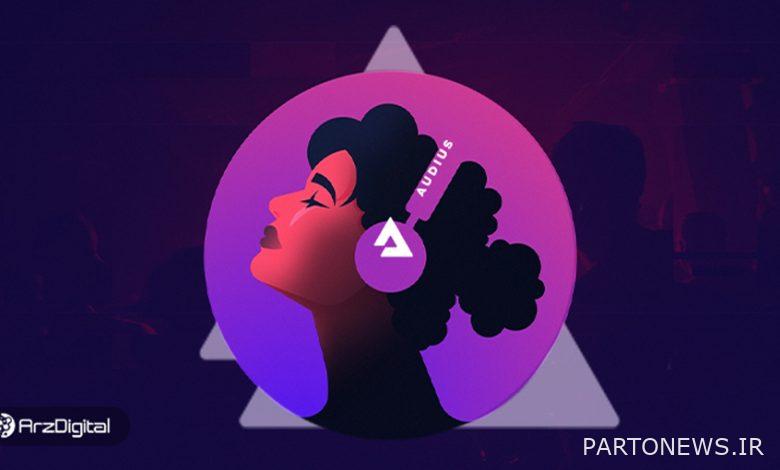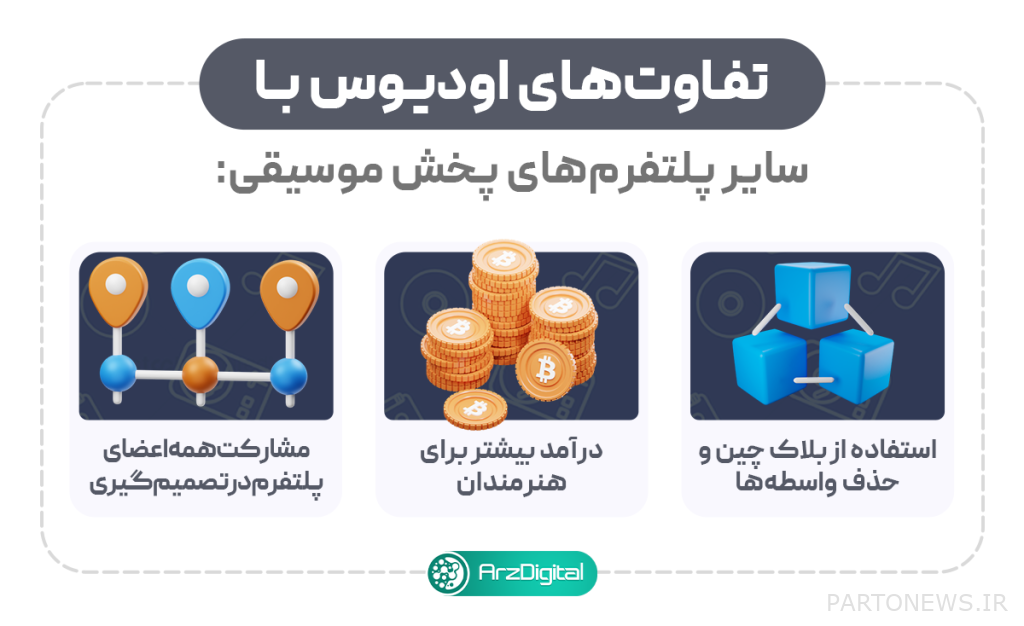What is Audius? An overview of the decentralized Odyssey music player platform

Digital currencies initially emerged solely as financial instruments and value reserves; But with the growth of China’s blockchain technology, almost all areas of human life were affected by this technology; Today, almost everything we used to do with centralized institutions can be done decentrally with China Blockchain technology and digital currencies. The art world is no exception, and the range of digital currencies and blockchain technology has expanded.
Digital art is one of the most important areas that has represented the integration of Chinese art and blockchain, and the most prominent example in this area is the NFT. They created unparalleled revolutionary tokens in the way artists interacted with their audiences. Music, as one of the most important parts of art, has been influenced by this trend and has used decentralized methods to change the ownership and publication of music and the interaction of artists and audiences.
The advent of centralized music streaming platforms has made it easier for audiences to access music than ever before; But artists in the music industry have always faced challenges such as low revenue and low transparency, and have little authority in distributing and selling their content. Blockchain came to the aid of artists to give them transparency and to give them the benefits of art in a fair way. One of the platforms that uses China Blockchain technology to help artists is the Audius platform. Odysseus aims to overcome these challenges by empowering music owners and helping them make money from their work.
Content that you have before you by using an essay The Odance platform is written from the Binance exchange website. Join us to learn about the goals, how it works and the features of this platform.
What is Odysseus?
Audios is a completely decentralized music streaming platform that allows people to support artists directly through the network’s native token, AUDIO. According to available data, by the end of 2021, 6 million unique users used Odios every month and more than one hundred thousand artists published their works on it.
Odyssey was created in 2018 by Forrest Browning and Roneil Rumburg. This platform transforms the music industry by eliminating intermediaries and music distribution companies.
In Odyssey, unlike other music streaming platforms, artists’ income is not determined by the number of times they play music. Odysseus gives the artists exclusive ownership of the music, and they decide for themselves how to make money from their work. In this platform, the owners of the works receive 90% of the income in the form of Odyssey tokens and the other 10% is paid to the node operators (shareholders) who support the network.
Odyssey is a second-tier Chinese blockchain protocol that was first built on one of Atrium’s side chains called the POA Network; But as demand for content distribution grew, it ran into scalability problems, and in 2020 decided to move its content management system to the Solana blockchain to improve performance.
However, the Odyssey native token remains in the Atrium blockchain. The Audio Token is an ERC-20 that allows shareholders to vote on proposals for network changes and upgrades. Shareholders can also take advantage of platform-specific capabilities by sharing audio tokens.
How does Odysseus work?
As mentioned, Odysseus aims to address the challenges that artists face in the music industry; Challenges including music property rights. Odios’s solution is that everyone is free to distribute and play their music on this platform and earn money from it. Odyssey eliminates intermediaries between artists and their audiences so that they can interact directly with each other on the platform.
Unlike traditional music streaming platforms, Odyssey pays artists not only based on the number of times the music file is played, but also the artist’s activity on the platform, how he interacts with fans, and how well users respond.
Artists can upload their music through decentralized nodes on the Odyssey platform. There are several ways to monetize audio content in Odyssey, none of which require the transfer of ownership.
Artists whose work is included in the list of the top five audio files of the week, the top five playlists of the week or the top 10 programs of the month will receive an audio token as a gift. They also receive audio tokens the first time they make a social network account after verification.
The Odyssey platform also allows artists to interact with their audience community through artist tokens. Artistic tokens give their owners special access to proprietary content, such as unpublished works and mix competitions.
Audios also occasionally awards audios tokens based on the extent of the artist’s social interactions with their fans and the number of times their music is played.
Odius plans to provide support for Tetra (USDT) and other stable coins for fan payments in the future.
Characteristics of Odyssey

In order to continue its operations, Audio needs to provide network security to ensure the correctness of transactions, a mechanism for resolving potential disputes or deciding to make changes and upgrades to the network and determine how to grant access to special features whose native token, Audio, plays a pivotal role. It all plays out.
Security
Odyssey network security is provided through decentralized nodes. Anyone can run a node on the Odyssey network by producing and sharing Audio tokens. The more tokens you share, the more likely that shareholder will have 90 users choose to use them. Shareholders receive rewards in the form of audio tokens from the issuer of new tokens and fee pools because they assist in the implementation of the protocol operation.
There are two types of nodes on the Odyssey platform: Content nodes (content node) and Explore nodes (discovery node). Content nodes are responsible for hosting, securing and managing content by artists. Of course, artists can perform content nodes themselves and host their own content; But this option is optional. The search nodes list the peripherals and music files that load into the Odyssey Content notebook so that fans can quickly search among artists and songs.
The nods continuously send the list of artists’ works to the Chinese block. This creates an immutable timestamp of content.
Governance
Another role of the Audio token is in the dominance of the Audios network. As mentioned earlier, shareholders can participate in network operations as content nodes or exploration nodes. Users can gain sovereign power by continuously generating value for the network, thereby voting on proposals to upgrade the network.
Of course, in order to get the right to vote, it is not necessary for the shareholders to be ninety executors. Odysseus encourages his community to share their ideas about the protocol. Each audio token guarantees a voting right. The purpose of the rewards given in the form of audio tokens to artists, fans and operators of the nodes is to encourage them to enjoy a decentralized music playback experience.
Special access
Audio Tokens allow users and artists to access platform-specific capabilities. Artists can use the audio token to enlarge their fan base and improve their communication with them. They can also access content distribution tools by sharing audio tokens to distribute their art tokens to their fans. Fans with an art token can use it to enjoy the artist’s content and unique experiences such as listening to unpublished songs and participating in mix competitions.
Users who have a certain amount of Audio tokens in their Audios wallet have the opportunity to be in a special position (VIP) and can enjoy more benefits than others. The more tokens users have, the higher their dedicated position. When a user’s tokens reach the minimum required for a specific location, they receive a profile badge that allows them to access new features. The requirements and benefits of each of the dedicated positions may vary based on community decisions.
What is the difference between Odyssey and other music streaming platforms?

One of the most important differences between Odyssey and other music streaming platforms such as Spotify is its use of blockchain technology to provide a decentralized space. This allows artists and content owners to have more control over the songs they release.
The founders of Odyssey say that 90% of the platform’s revenue is paid directly to artists. Compare that to the traditional arena of music, where only 12 percent of the proceeds from song sales go to artists. On this account, Odyssey allows artists to earn much more.
Another difference is that the Odyssey platform engages audio token holders, artists and fans, in the network decision-making process. Each audio token guarantees a vote on the validity of the protocol for its holder. Audio owners can vote for or against any of the proposed platform changes. This is not the case with other music-focused services.
Also, as we mentioned, Odyssey has the ability to help artists expand their fan base. Odyssey is the first music streaming platform to partner with the video social network TikTok. Thanks to this partnership, TickTalk users can upload songs from the Odyssey platform directly to their videos. Odyssey is also integrated with DeFi Land Chinese blockchain game. In the game’s metatarsal, Odyssey takes the form of an FM radio tower, promoting artists.
What is an Audio Token?

Audio Token is actually the native digital currency of the Odyssey platform and has three functions in this ecosystem:
- Provide network security
- Government Token
- Provide access to proprietary features and content
The audio token is an ERC-20 and was released in the initial release of one billion units. This token has no ceiling for supply, meaning it can be distributed indefinitely. More than 500 million audio tokens were in circulation by December 2021.
Audio tokens, like many other tokens, can be used both on the platform network and as a form of value storage in digital currency exchanges. At the time of writing, each AUDIU is trading at $ 1.17. In March 2021, this token managed to set a price record of $ 4.
Conclusion
China’s digital currencies and blockchain technology have transformed all areas of our lives, and the art world is no exception. Music is also one of the most important fields of art that has begun to interact extensively with digital currencies and blockchain technology. One of the most striking examples of the integration of blockchain music and technology is the unique tokens that have revolutionized the way artists interact with their audiences.
One of the innovations of blockchain technology in music can be seen in music distribution platforms, which has led to a profound transformation in the ownership of music and communication between music activists and audiences. The Odyssey platform is one of those platforms that removes traditional intermediaries from the relationship between singers and musicians and fans.

